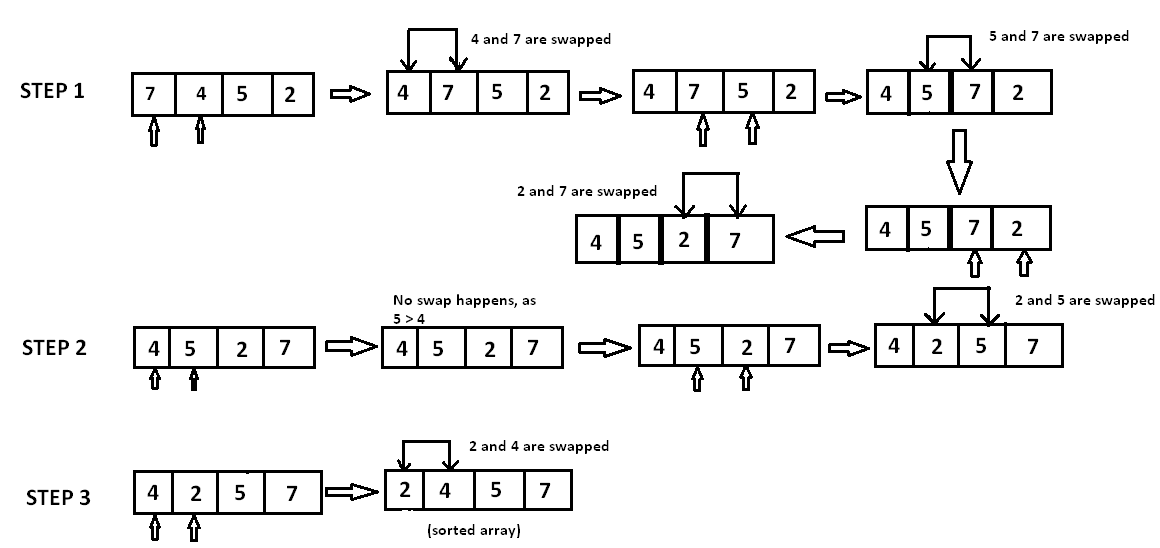Basic Sorting Algorithms
So today , we will be talking about sorting algorithms,
The most basic sorting algorithm is bubble sort.
Let us have an array of length n ;
Then we iterate over the whole array and for every element we check all the following elements :
If any element has a value greater than the given element we swap the elements .
In the end We will have an array sorted in ascending order.
Here is the code snippet for it :-
for(i=0;i<n;i++)
{
for(j=0;j<n;j++)
{
If(arr[i]>arr[j])
{
swap(arr[i],arr[j]);
}
}
You could make this more efficient by first finding the minimum value and then swapping , that is called the insertion sort.
Now , this algorithm takes O((n^2) time , and hence is not efficient .
So we go on to look to a sorting algorithm which takes O(nlogn) time complexity.
It is called mergesort
It has a recursion based approach .
So the code works as follows , divide the array into two parts , then call mergesort for both halves and merge the two parts .
This time complexity can be found by the recursion tree.
Here is the code snippet :-

We finally discuss the easiest option we have is to use the C++ stl library inbuilt function of sort.
It is the most efficient sorting algorithm and works in O(nkogn) time.
It is a mixture of quicksort,radixsort and mergesort.
It can be used as follows by including the <algorithm> library
std::sort(arr,arr+n)
It has the parameters , 1. Starting pointer ,
2. Ending pointer ,
3. Function on the basis of which to sort (ascending is by default :- this parameter is optional)
Please leave any comments for any doubts
The most basic sorting algorithm is bubble sort.
Let us have an array of length n ;
Then we iterate over the whole array and for every element we check all the following elements :
If any element has a value greater than the given element we swap the elements .
In the end We will have an array sorted in ascending order.
Here is the code snippet for it :-
for(i=0;i<n;i++)
{
for(j=0;j<n;j++)
{
If(arr[i]>arr[j])
{
swap(arr[i],arr[j]);
}
}
You could make this more efficient by first finding the minimum value and then swapping , that is called the insertion sort.
Now , this algorithm takes O((n^2) time , and hence is not efficient .
So we go on to look to a sorting algorithm which takes O(nlogn) time complexity.
It is called mergesort
It has a recursion based approach .
So the code works as follows , divide the array into two parts , then call mergesort for both halves and merge the two parts .
This time complexity can be found by the recursion tree.
Here is the code snippet :-
void merge(int A[ ] , int start, int mid, int end) {
//stores the starting position of both parts in temporary variables.
int p = start ,q = mid+1;
int Arr[end-start+1] , k=0;
for(int i = start ;i <= end ;i++) {
if(p > mid) //checks if first part comes to an end or not .
Arr[ k++ ] = A[ q++] ;
else if ( q > end) //checks if second part comes to an end or not
Arr[ k++ ] = A[ p++ ];
else if( A[ p ] < A[ q ]) //checks which part has smaller element.
Arr[ k++ ] = A[ p++ ];
else
Arr[ k++ ] = A[ q++];
}
for (int p=0 ; p< k ;p ++) {
/* Now the real array has elements in sorted manner including both
parts.*/
A[ start++ ] = Arr[ p ] ;
}
}
We finally discuss the easiest option we have is to use the C++ stl library inbuilt function of sort.
It is the most efficient sorting algorithm and works in O(nkogn) time.
It is a mixture of quicksort,radixsort and mergesort.
It can be used as follows by including the <algorithm> library
std::sort(arr,arr+n)
It has the parameters , 1. Starting pointer ,
2. Ending pointer ,
3. Function on the basis of which to sort (ascending is by default :- this parameter is optional)
Please leave any comments for any doubts



Comments
Post a Comment